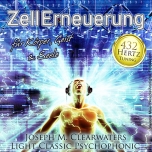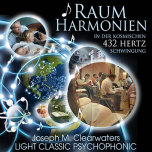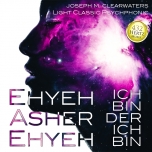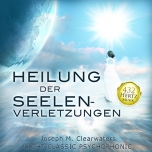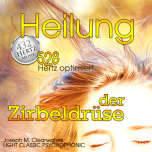The LCP-Method
The LCP-Method:
(Further use, even in excerpts, only permitted with written permission/licence).
► Our music is only permitted for private use - for commercial purposes please read here under Licences.
With the LCP method we offer you a very special way of "goal realisation":
LIGHT - Light as a symbol of the strongest power.
CLASSIC - Classic as a symbol of musical representation.
PSYCHOPHONIC - The effect of music on the psyche.
The LCP music brings conscious thought and all feelings or emotions to the same frequency!
Conscious thought and the associated feelings are raised to the desired FREQUENCY through LCP music. This means that thoughts and feelings (the unconscious & all emotions) should vibrate in the same way in order to achieve a certain (desired) goal.
Positive thinking alone is of no use if one feels an opposite emotion to it. This is exactly where LCP music intervenes to tune your feelings and subconscious mind to your visual and mental goals.
So our LCP music acts as an information carrier - it carries the necessary energies/vibrations/frequencies to set up your subconscious mind to your goals.
About LCP music:
With LCP music, the target, i.e. an information, is deeply anchored in the subconscious and begins to work there. The subconscious connects the information with the music. Through the music, one is reminded of the goal again and again. The music carries the information, it is the information. The subconscious stores and activates it by listening to the music. Quite logical, quite simple! And always the positive, harmonising information is set in motion by the music. And that is solely through your personal specifications - the music is like pure water. What you add to the water, it will absorb. The music itself is neutral like pure water: clear, pure, life-giving on all levels:
"Where language stops, music begins to work".
According to this statement, the effect of our music is precisely described in each case. The themes indicate a certain direction to which you can add further personal information.
The music contains the profound information for transformation.
Programme with a LCP music of your choice from our range.
Everything else is done by your Higher Self & the music, which perfectly removes all blockages and stuck patterns to the chosen theme!
Play the music as often as you can and preferably in a way that feels good for you personally. Experiment and follow your own intuition.
Formulate a positive sentence to various topics and let the music work!
About the LCP method:
Every "illness" (everything that is not in harmony is ill - so this does not only mean the body!) has its origin in the psyche, in thinking, in holistic beliefs.
These convictions originate from conditioning of all kinds.
Since childhood, every human being has been implanted with beliefs by parents, relatives, acquaintances, teachers, religion, the state, society, etc. These beliefs are active without us being aware of them.
They are sometimes called "patterns" - "blockades" - "beliefs" - even "opinions" or even called "character traits". These conditionings - blockades - are probably effective because they are firmly anchored in you.
The mind itself, however, can only work selectively in everyday life. Better said: we usually have something else to do than deal with our blockages.
So what to do?
So how can you definitely erase blockages - illnesses - beliefs? It looks like an incredible amount of work. It is unbelievable how deeply and firmly anchored in each of us are unhealthy and destructive beliefs.
How to change them?
How to even recognise them?
1. think differently!
First think carefully about what you really want!
2. your feelings are very important!
They are your barometer, so to speak. They tell you whether your thoughts are supported by your feelings. Only if you feel good about a certain thought, the desired thing can come true. Thoughts (positive thinking) alone are of no use if the feelings express the opposite.
3. This is exactly where our music comes in:
It supports you in bringing your feelings in line with your thoughts, on one frequency!
Your wholeness (body, mind and soul) always acts exactly according to your instructions! And from this you create a new reality for yourself, a new reality.
And to make it really easy, use our LCP method:
Suggestion for LCP programming:
Example Topic: I deserve to be happy!
For this they can also set the following programming:
Tell your subconscious:
"Every time this music plays, erase all the beliefs that prevent me from being happy. (... right here you insert the respective programming sentence, all other sentences that follow here remain the same every time).
Whether I think about it or not. If I should think and feel something like:
I can't. I don't believe that. I don't. That would be too easy. My experiences tell me something different.(Insert here whatever else comes to mind and suits you!)
... ...you immediately delete all these denying blockages. And you also delete all other beliefs that I don't know about and that have to do with this problem.
Everything, feelings, thoughts, everything that has to do with it, you delete.
I myself do not need to concentrate.
You do it all by yourself, without me having to think it! Thank you."
Tips:
► You can use these sentences according to your usual language - don't force yourself to do anything that contradicts your inner self. Just make sure that the meaning is right.
► If you are programming, try to consciously formulate your sentences positively in the future.
So don't:
"I don't want any more headaches. (or) I have no money. (etc.)"
But rather: "I am completely sung. - I am content. - I am fine."
Have you noticed that all LCP programming is worded postively?
Pay attention to what and how you think, speak and act.
► Surely you have heard that your entire body keeps creating itself throughout life. And it does this all by itself! Your skeleton, for example, is constantly renewing itself. In the course of a seventy-year life, the body produces a completely new skeleton twelve times.
How can it be possible to feel the same pain all the time?
Or how is it possible that people are cured by the placebo effect?
Think about it. And then think again!
It can only be the mind, the totality of your being, your faith, your belief!
► Your feelings tell you if something is wrong. Pay attention to your feelings.
If you do not feel well, bring yourself into balance, into a cheerful, happy mood. Use the LCP music for this as well.
Swing into a new frequency.
Feel your way into your new, holistic, perfect "health!
► Steer your life in a different direction: There is only one health - and many diseases!
► So think of the one health - in every area of your life!
► Choose a title from our many offers of music that has something to do with the topic you want to change.
► You can use our audio samples to make sure that the music appeals to you.
► Think carefully about what you want to programme next.
► Start with a slightly smaller problem. Don't expect too much of yourself all at once.
► It should be fun. Humour and expectant joy are one of the most important basic attitudes for powerful success.
► Write down what you would like to change.
► Make sure you are undisturbed. Then play the music and take it all in - breathe it in.
► You can play the music loudly, but also soundlessly. It works!
► Take it with you, e.g. on an MP3 player, in the car, while you are cooking, etc. There are many possibilities, depending on your personal everyday life.
► You have no choice at all with LCP music but that what you programme with it comes true!
► Music works on a level that is incomprehensible to us, the law of attraction.
Music is the one immaterial access to the higher realms of knowledge that understands man without man understanding it.
(Ludwig van Beethoven)
The whole system of creation is based on vibration - the energy that attracts what it projects outwards.
And the LCP method supports you in an effortless way as it creates what is desired for you.
According to Hermes Thoth & the famous Emerald Tablets: As above, so below; as within, so without.
Like a magnet, what you send out through the vibration of music will be drawn into your life.
And an exceedingly important part you must never forget:
► Gratitude is a very important aspect of the successful method! Never forget to give thanks for everything you already have and always give thanks for what you receive.
Use this opportunity of Energetic Music to cleanse, transform and create a new consciousness to be a new person.
We live in a time that challenges us to change our consciousness!
Another note on the LCP method:
► The LCP method is applicable with many other of our music titles!
In the music category LCP-Method you will find music composed especially for this method to get to know the LCP-Method and its funtion.
There are ready-made application texts (recommendation for application) for the LCP music pieces, which you can of course also use with many other music pieces from us.
Note:
At the same time, always follow the advice and prescriptions of your doctor!
Orthodox medicine is one of the most important achievements of mankind.
The LCP method is a wonderful complement to this.
© Text & Title Copyright by Clearwater
(Further use, even in extracts, only permitted with written permission / Licences.).

